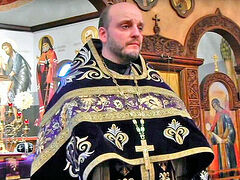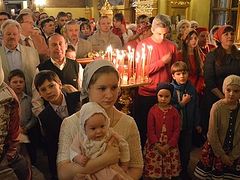The Soviet State steamrolled Christian life in Russia. And despite the thirty years of religious freedom, many institutions are yet to be restored. Among the most important ones is the Christian community, which is inconceivable without active laypeople. We asked some Russian and foreign priests to talk about the extent to which laypeople should be involved in parish life.
The community needs your involvement
Priest Nikolai Tikhonchuk, priest of the Church of the icon of the Mother of God “Joy of All Who Sorrow” and St. Genevieve of Paris in the Korsun Diocese of the Russian Orthodox Church, a male nurse of a Paris hospital:
 Priest Nikolai Tikhonchuk As much as possible. Because most parishioners have other responsibilities in their lives, such as family and work. We clergy should take this into account and show understanding. When there is a parish council and a living community, everything works like clockwork. When each member of the community is in his place, it is organic work. Our parish meets three times a year. We discuss everything—the priests with members of the parish council, which is constantly updated so everyone can be involved in the life of the community as much as possible.
Priest Nikolai Tikhonchuk As much as possible. Because most parishioners have other responsibilities in their lives, such as family and work. We clergy should take this into account and show understanding. When there is a parish council and a living community, everything works like clockwork. When each member of the community is in his place, it is organic work. Our parish meets three times a year. We discuss everything—the priests with members of the parish council, which is constantly updated so everyone can be involved in the life of the community as much as possible.
We always try to say that there are other important forms of service in the Church—cleaning, baking prosphora or singing in the choir. People who join the community immediately get the feel of it—to be a Christian is an additional responsibility, and it isn’t just coming on a weekend and taking Communion. The community needs your involvement. It is important when a person feels that he is needed. We try to understand what is interesting to people who come to us and what they would like to do. Singing in the choir or engaging in catechetical activities? You are welcome. It is interesting how a parishioner himself sees his role in the parish and what he wants to do. It is important that a person feels needed at the parish. This motivates him to do something, and he brings something new to the community life.
Outsiders
Archpriest Alexander Dyachenko, rector of the Church of the Tikhvin Icon of the Mother of God in the village of Ivanovo, Alexandrov Diocese (Vladimir region), and diocesan missionary:
 Archpriest Alexander Dyachenko Laypeople should feel their involvement in everything that happens in church. This is their church, and they should share work on its maintenance, decoration and other matters with the rector. But pastoral care rests with the priests. If there is trust and mutual understanding between the rector and the rest of the community, then laypeople can and should be encouraged to get involved in the affairs of the community and even its leadership.
Archpriest Alexander Dyachenko Laypeople should feel their involvement in everything that happens in church. This is their church, and they should share work on its maintenance, decoration and other matters with the rector. But pastoral care rests with the priests. If there is trust and mutual understanding between the rector and the rest of the community, then laypeople can and should be encouraged to get involved in the affairs of the community and even its leadership.
But not always. There is a disease of small rural communities, where the priest tries to create an active parish and rejoices in any new parishioners, including neophytes... Before allowing them to be actively involved in parish life (and they tend to be excessively active) a priest needs to size them up. Because it often appears that these “outsiders” are those who cannot get along in any team and drift from one parish to another. Because of such people discord and squabbles often arise in communities. It all depends on the rector’s experience.
Feasible sacrifice, feasible work
Archpriest George Zavershinsky, head of the Deanery of Scotland and Northern Ireland of the Diocese of Sourozh, Ph.D. in Philosophy and Technical Science, Master of Theology, and member of the Russian Writers’ Union:
 Archpriest George Zavershinsky Fully. To the extent a person devotes himself to God, life according to the commandments and participation in the Church sacraments—that is, parish life, centered around the Liturgy. To provide everything necessary for its celebration and help those who are preparing to join the Church or asking questions. It is important that parish life is liturgical, that it is not limited to praying and standing in church during the services, but continues in the parish house, in families and at work. This is direct involvement in parish life by those who consider themselves members of the community: feasible sacrifice, feasible work to decorate the church, and drawing in those who are interested and want to learn more in order to become Orthodox Christians.
Archpriest George Zavershinsky Fully. To the extent a person devotes himself to God, life according to the commandments and participation in the Church sacraments—that is, parish life, centered around the Liturgy. To provide everything necessary for its celebration and help those who are preparing to join the Church or asking questions. It is important that parish life is liturgical, that it is not limited to praying and standing in church during the services, but continues in the parish house, in families and at work. This is direct involvement in parish life by those who consider themselves members of the community: feasible sacrifice, feasible work to decorate the church, and drawing in those who are interested and want to learn more in order to become Orthodox Christians.
A spiritual family
Archpriest Gabriel Makarov, Dean of the St. Nicholas Cathedral of the Russian Orthodox Church Outside of Russia in Brisbane (Australia):
A parish is a large spiritual family. People are wrong to get used to going to church with everything provided for them, not bothering to get involved in the goals, difficulties and responsibilities of the parish and parishioners. It is good for every parishioner’s soul to be more than just a witness of life in his parish. He should also be a participant!
Parishioners’ self-organization is important
Priest Alexei Guglivaty, rector of Edinoverie communities in the town of Kurovskoye, the villages of Avsyunino and Mistsevo near Moscow:
 Priest Alexei Guglivaty The question hits the nail on the head. It is necessary to decide to what extent. There is a Latin saying: “Quod licet Iovi, non licet bovi” (“what is permitted to Jupiter is not permitted to an ox”). An urban parish is one thing, and a rural parish is another.
Priest Alexei Guglivaty The question hits the nail on the head. It is necessary to decide to what extent. There is a Latin saying: “Quod licet Iovi, non licet bovi” (“what is permitted to Jupiter is not permitted to an ox”). An urban parish is one thing, and a rural parish is another.
Type 1: the urban parish, where three clergymen serve daily. There is a Sunday school, permanent parishioners, singers from the left (“people’s”) choir. There is a very broad range of work. There are all kinds of institutions in the city that require charitable assistance. An initiative group may form in the parish to help lonely pensioners, prisoners, children from orphanages—parish activities in which parishioners can and should be involved. Arrangement of meals—why not? But at the initiative of the parishioners. Self-organization of parishioners is important, even if they act with the rector’s blessing, but make decisions themselves. This condition is important for all types of parishes.
Type 2: the small-town parish. There is only one priest, services are not held every day, the parishioners are mostly old, but there are a small number of young people. Most likely in such a parish a people’s choir will sing, which is not paid (at best, the choir director is). Its parishioners can be on duty in the church—we do this in ours. Active parishioners are on duty at the candle box for a week. They clean up, receive donations for candles and services of need, take care of the parish garden, and are charged with reading texts in Church Slavonic in order to join the people’s choir in the future.
Type 3: the rural parish. The priest serves when he can. Most parishioners have their own kitchen-gardens or stables. People are mostly elderly. But we know that often it is not villagers who go to such churches, but believers from towns and cities. How can they get involved? I think that on Sundays they could perform obediences during the Divine Liturgy: Some will read, others will sing in the choir, someone will ring the bells... They can create an orchard or a vegetable garden by the church. It is not the priest but the parishioners who must take care of everything.
There is no community without people
Priest Valery Dukhanin, priest of the Church of St. Pimen at the St. Nicholas-Ugresh Theological Seminary (Dzerzhinsky, near Moscow) and Doctor of Theology:
 Priest Valery Dukhanin Parish life is inconceivable without the involvement of the laity. After all, this is a church community, and there is no community without people. If a pastor has not learned how to build relationships with parishioners properly, life in the parish will quickly decline. People will come to the service as outsiders. And if you are a real pastor, they will support and help you, restore the church together with you, organize festive events, have the Sunday school staffed with teachers, provide you with legal assistance, go on pilgrimage trips with you, and much more.
Priest Valery Dukhanin Parish life is inconceivable without the involvement of the laity. After all, this is a church community, and there is no community without people. If a pastor has not learned how to build relationships with parishioners properly, life in the parish will quickly decline. People will come to the service as outsiders. And if you are a real pastor, they will support and help you, restore the church together with you, organize festive events, have the Sunday school staffed with teachers, provide you with legal assistance, go on pilgrimage trips with you, and much more.
Today it’s the custom of every parish throughout the Church to organize different types of service: in particular, catechism, youth and social ministry on a continuing basis. There are also missionary and volunteer services. In addition, it is necessary to maintain churches’ websites and social media pages and fill them with materials. Who will do all this? Only parishioners will. In this sense, it is good when the rector is the father-confessor of the laypeople who are engaged in various parish services. Everything should be subordinated to the main thing—the salvation of souls, and not someone’s personal ambitions.
That is, in our days the involvement of laypeople in parish life must be active. But what a layman should definitely not do is lead the parish, with obsessive advice to the rector on who to accept and who to dismiss, with whom to communicate and who to avoid—that is, attempts to replace the rector with his or her own “active” involvement. Such activity should be ruled out.
Thus, let laypeople be involved in parish life as much as this builds the life of the church and contributes to their personal path to God. If your involvement damages parish life and your own spiritual life, it is better for you to pray at the service humbly, without interfering in the inner life of your church.






